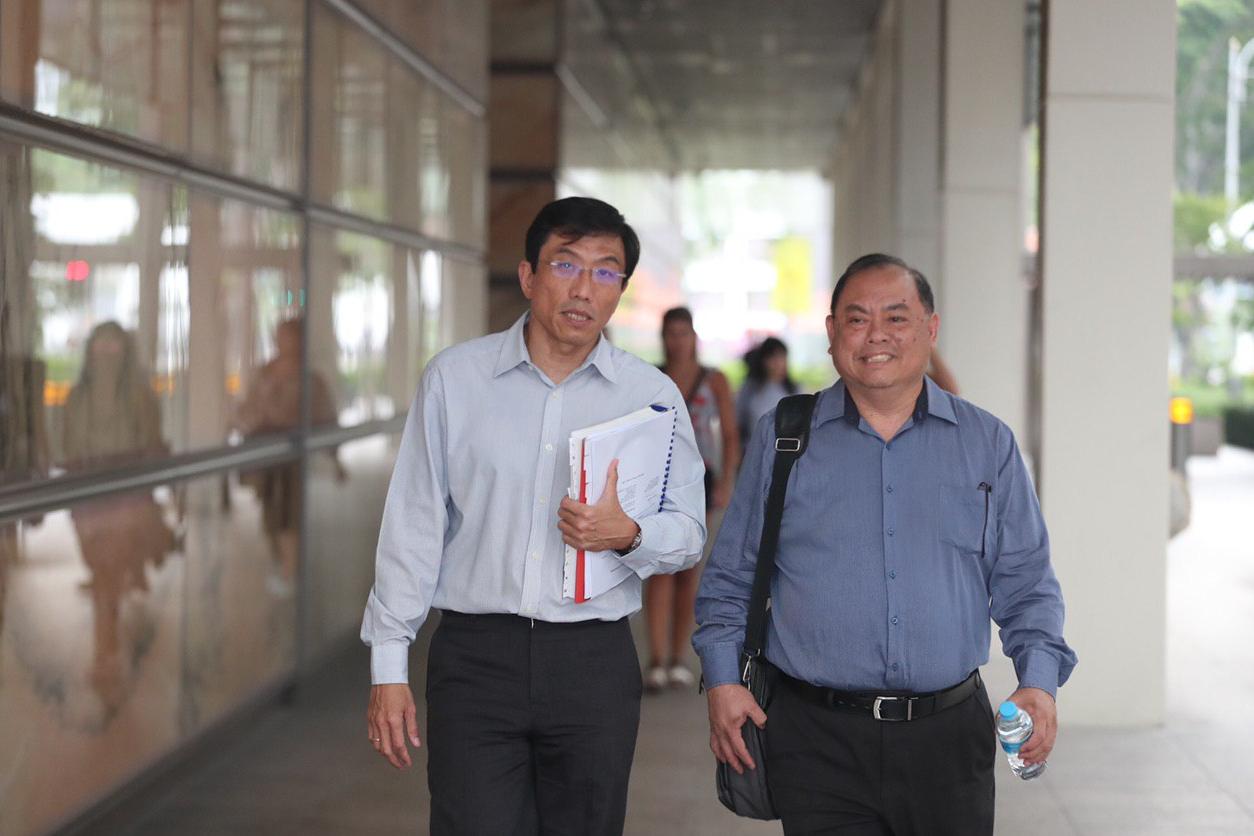High Court rejects SDP's application to have Pofma case heard in open court
Sign up now: Get ST's newsletters delivered to your inbox

SDP secretary-general Chee Soon Juan (left) and vice-chairman John Tan leave the Supreme Court on Jan 16, 2020.
ST PHOTO: TIMOTHY DAVID
SINGAPORE - A High Court judge has dismissed an application by the Singapore Democratic Party (SDP) to have its case, challenging two corrections issued against it under the fake news law, heard in open court.
The case, in which the Attorney-General's Chambers (AGC) is named as respondent, continues in chambers and is not open to the public or the media.
Speaking to reporters on Thursday (Jan 16) outside the courtroom, Deputy Attorney-General Hri Kumar Nair said Justice Ang Cheng Hock had rejected SDP's application, as there was "no special reason" for the case to be heard in an open court.
He added that public interest was not enough of a reason for a given case to be moved from chambers to an open court, and that many past cases - even those involving constitutional changes - have not been deemed "special enough".
Mr Nair said: "For example, as recently as the challenge against the elected presidency amendments, there was an application for it to go to open court. That was dismissed, although no doubt there was strong public interest over that, because it just doesn't meet the legal threshold."
All cases brought by originating summons (OS) - one of two ways of initiating a civil action - are heard in chambers, according to established court rules.
The High Court had told The Straits Times on Tuesday that the SDP's application was filed by OS.
This was in accordance with the Protection from Online Falsehoods and Manipulation Act (Pofma) rules, which provide that all High Court challenges against Pofma corrections must be filed by OS, the High Court had said.
This means that, by default, all Pofma cases will be heard in chambers unless there is a legal reason for it to be heard in an open court.
The SDP case involves two corrections ordered last month by the Manpower Ministry for two of the party's Facebook posts and an article on its website, which the ministry said contained falsehoods about the employment of Singaporean professionals, managers, executives and technicians (PMETs).
Mr Nair said on Thursday that the law provides for a specific list of originating summonses which will be heard in open court.
"Pofma cases don't fall into that list, so you have to show some special reason why this particular Pofma case should be heard in open court," said Mr Nair, adding that this did not mean no Pofma case will ever be heard in open court.
"You look at the facts of the case and the arguments were involved. I did submit that, as far as the arguments in this case are concerned, the underlying facts are really not in dispute," he said.
"Both parties are relying on the same MOM statistics and no one is saying those statistics are wrong. The issue before the court is quite a narrow one."
SDP secretary-general Chee Soon Juan, who was in court with party chairman Paul Tambyah and vice-chairman John Tan, said the decision was "very disappointing".
"In this case, it is not just about statistics but there are interpretations and opinions. There has to be more than one opinion and interpretation. That being the case, the public should hear both sides of the argument," Dr Chee said.
"The fact that the Ministry of Manpower has not publicly stated its reasons for rejecting our application, all the more the public then should be able to hear for themselves in court. It is very disappointing."
The ministry had said on Jan 6 that the SDP's application "does not provide sufficient grounds for the cancellation of the correction directions".
The SDP's Facebook posts are linked to the article "SDP Population Policy: Hire Singaporeans First, Retrench Singaporeans Last", which claims that a rising proportion of Singaporean PMETs are being laid off.
The posts were also accompanied by infographics that depicted the employment of local PMETs as having fallen, and unemployment of this same group as having risen.
On Jan 3, the SDP applied to the MOM to have the corrections cancelled. Manpower Minister Josephine Teo rejected the application last Monday, and the SDP filed its court challenge last Wednesday.
Mr Nair said Parliament had promised a "swift procedure" for Pofma challenges in the High Court, but when it comes to the hearing, "it depends on the complexity of the case".
He added: "It is not provided in legislation when the judge will decide, but the process is swift."
In issuing the correction notices, the Manpower Ministry had noted, among other things, that there has been no rising trend of local PMET retrenchment.
MOM had cited data from its Labour Market Survey to show the number of retrenched local PMETs had fallen between 2015 and 2018.
But the SDP, also citing the Labour Market Survey, included data from 2010 onwards to argue that there is a longer-term upward trend.
On Thursday, Dr Tambyah said the SDP is disputing the way the ministry has interpreted the statistics.
"The MOM has decided that 2015 to 2018 is the magic period... This is an arbitrary use of a time period that doesn't make sense. Because basically it's an interpretation of statistics," he added.
The hearing on SDP's challenge to cancel the correction notices continues.


